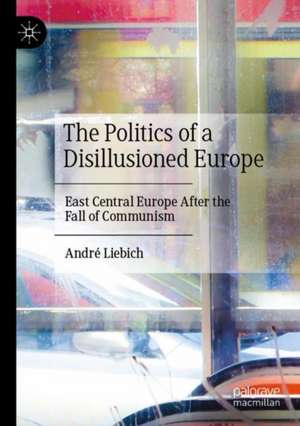The Politics of a Disillusioned Europe: East Central Europe After the Fall of Communism
Autor André Liebichen Limba Engleză Paperback – 18 noi 2022
| Toate formatele și edițiile | Preț | Express |
|---|---|---|
| Paperback (1) | 690.90 lei 6-8 săpt. | |
| Springer International Publishing – 18 noi 2022 | 690.90 lei 6-8 săpt. | |
| Hardback (1) | 696.35 lei 6-8 săpt. | |
| Springer International Publishing – 17 noi 2021 | 696.35 lei 6-8 săpt. |
Preț: 690.90 lei
Preț vechi: 812.83 lei
-15% Nou
Puncte Express: 1036
Preț estimativ în valută:
132.21€ • 138.31$ • 109.82£
132.21€ • 138.31$ • 109.82£
Carte tipărită la comandă
Livrare economică 02-16 aprilie
Preluare comenzi: 021 569.72.76
Specificații
ISBN-13: 9783030839956
ISBN-10: 3030839958
Pagini: 178
Ilustrații: IX, 178 p. 2 illus.
Dimensiuni: 148 x 210 mm
Greutate: 0.25 kg
Ediția:1st ed. 2022
Editura: Springer International Publishing
Colecția Palgrave Macmillan
Locul publicării:Cham, Switzerland
ISBN-10: 3030839958
Pagini: 178
Ilustrații: IX, 178 p. 2 illus.
Dimensiuni: 148 x 210 mm
Greutate: 0.25 kg
Ediția:1st ed. 2022
Editura: Springer International Publishing
Colecția Palgrave Macmillan
Locul publicării:Cham, Switzerland
Cuprins
1. Introduction.- 2. Poland.- 3. Hungary.- 4. Czech Republic.- 5. Slovakia Romania.- 6. Bulgaria.- 7. Minorities.- 8. Migration.- 9. The European Union.- 10. Conclusion.
Recenzii
“The scientific contribution of the book is credible and welcomed. ... it contains extensive footnotes, which has not only references but also supplementary considerations and explanations. ... The author's effort to characterize all these countries' political, social, and economic evolution is remarkable. ... Throughout the book, clear language is used, easy to understand by the specialists and the general public.” (Gabriel Camară, Southeast European and Black Sea Studies, May 12, 2022)
Notă biografică
André Liebich is Honorary Professor of International History and Politics at the Graduate Institute of International and Development Studies, Switzerland.
Textul de pe ultima copertă
“Prof. Liebich depicts not only the history of post-communist regimes in Central-East Europe, but also these states’ internal agendas and transformative debates. This book lives that history through telling it once again, thus challenging accepted prejudices.” (Adrian Liviu Ivan, Professor, Babes-Bolyai University, Romania)
“East Central Europe is again on the news. After the fall of the Berlin Wall the region was hailed as a liberal champion; now it is scorned as an illiberal one. This seemingly puzzling metamorphosis is explained in a thoughtful and entertaining way by a leading historian of the region. I highly recommend Liebich’s book to all those interested in European politics and history.” (Jan Zielonka, Professor of European Politics, University of Oxford (UK), and Professor of Politics and International Relations, University of Venice, Cá Foscari (Italy))
“Moving from the fall of the Berlin Wall in 1989 to the present day, this book traces the trajectory of the six East Central European former satellites of the Soviet Union (Poland, Hungary, the Czech Republic, Slovakia, Romania, Bulgaria) that have joined the European Union. It seeks in particular to explain these countries’ disenchantment with the “return to Europe” in spite of their significant advances. The book proceeds country by country and then devotes chapters to some contemporary issues, such as minorities, migration, and the relations of these “new” members with the European Union as a whole. The book eschews theory and is intended for a general audience, including students at all levels in political science and history classes devoted to the EU and to contemporary Europe, and to an academic and practitioner audience interested in world affairs and the evolution of the European Union. The book strives to fill a persistent knowledge gap in the English-speaking world concerning East Central Europe, and to offer fresh insights about the region in the context of contemporary geopolitics.” (André Liebich is Honorary Professor of International History and Politics at the Graduate Institute of International and Development Studies, Switzerland)“East Central Europe is again on the news. After the fall of the Berlin Wall the region was hailed as a liberal champion; now it is scorned as an illiberal one. This seemingly puzzling metamorphosis is explained in a thoughtful and entertaining way by a leading historian of the region. I highly recommend Liebich’s book to all those interested in European politics and history.” (Jan Zielonka, Professor of European Politics, University of Oxford (UK), and Professor of Politics and International Relations, University of Venice, Cá Foscari (Italy))
Caracteristici
Presents a concise history of Central and Eastern Europe since 1989 Seeks to understand the region’s disenchantment with the EU as a result of political and economic circumstances Offers thought-provoking observations regarding the adoption of neo-liberal economics by the countries concerned
